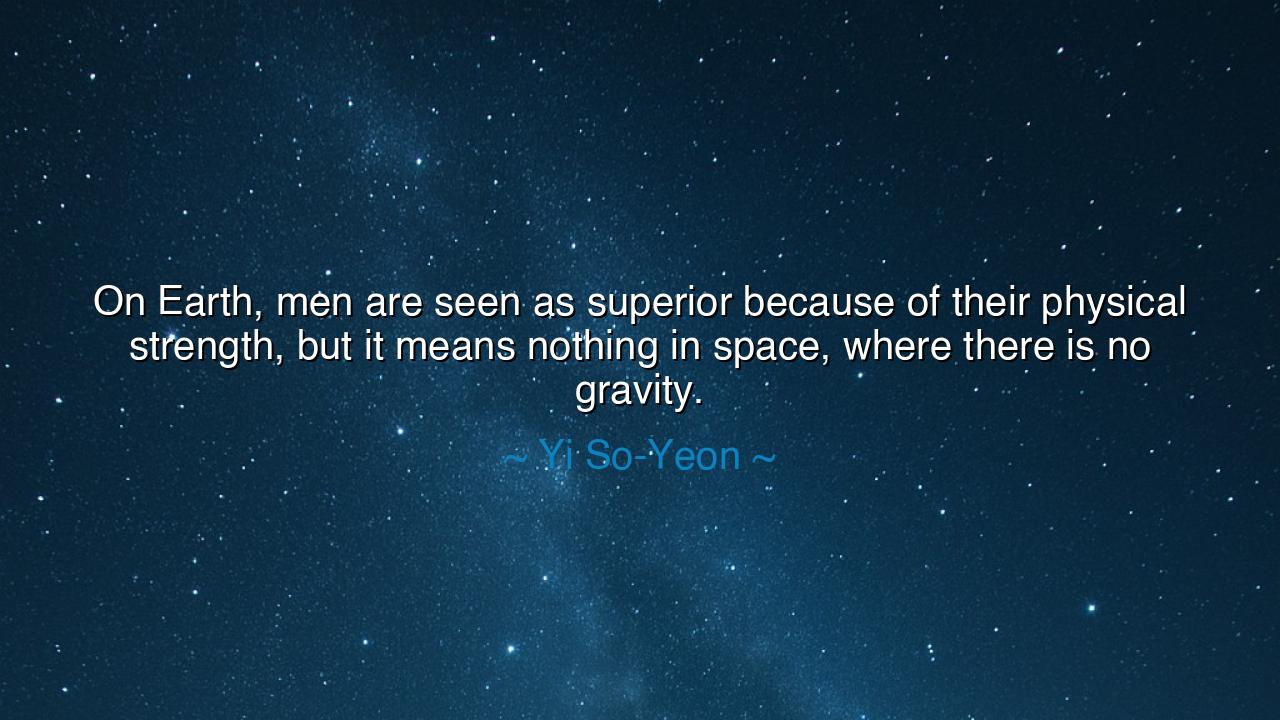
On Earth, men are seen as superior because of their physical
On Earth, men are seen as superior because of their physical strength, but it means nothing in space, where there is no gravity.






Hear the voice of Yi So-Yeon, the first astronaut of Korea, who carried her nation’s hopes into the heavens and spoke this truth: “On Earth, men are seen as superior because of their physical strength, but it means nothing in space, where there is no gravity.” At first, these words seem to be the reflection of one who has drifted beyond the bonds of the world. Yet they are more than observation—they are a revelation. For she declares that in the realm beyond the Earth, where gravity falls silent, the old measures of superiority collapse, and human worth is revealed anew.
On Earth, the history of men’s dominance was long tied to their strength—their power to lift, to labor, to fight. From the fields of harvest to the fields of battle, muscle was the currency of survival. And so, societies came to honor men above women, as though strength alone were the measure of value. But in space, the body’s weight becomes meaningless. There, a child could move as easily as a giant, and the strongest man floats no faster than the smallest woman. In this new world, the very ground of hierarchy dissolves. Yi So-Yeon, by her words, unveils this cosmic irony: what was once counted as supremacy becomes dust in the void.
This truth is not only about space—it is about liberation. For throughout history, women have been denied voice, power, and freedom on the grounds that they lacked the same physical might as men. Yet Yi reminds us that when the measure of strength is stripped away, intellect, courage, skill, and resilience shine through as the true pillars of greatness. In the silence of orbit, a woman’s hands guide machines, her mind calculates trajectories, her heart endures isolation. These are strengths not bound by muscle but born of spirit, and in them, the illusion of male superiority collapses.
History shows this lesson again and again. Joan of Arc, a young peasant girl, led armies not through brute force but through vision and faith, lifting a nation in despair. Marie Curie changed the world of science not with the strength of her arms but with the strength of her mind, uncovering secrets of atoms that even kings could not fathom. These women lived still on Earth, within the gravity of prejudice, yet they revealed that strength of spirit surpasses strength of body. Yi So-Yeon, rising into space, merely cast that truth into stark clarity: in the heavens, physical strength means nothing.
But let us not limit her words only to men and women. They are a teaching for all: that what the world praises as power may in truth be illusion. Wealth, titles, appearance, might—these too can fade when placed in a new realm, just as muscles fade in the absence of gravity. What remains are the qualities that no force of nature can strip away: wisdom, kindness, courage, perseverance. These are the true strengths that endure across every world.
The lesson is clear. Do not be deceived by false measures of superiority. Respect strength of body, but do not worship it. Seek instead to cultivate the strengths that cannot be undone by shifting circumstances—the strengths of the heart and mind. Build wisdom that outlives your years, compassion that softens even the hardest of lives, and resilience that endures when all else is stripped away. For these are strengths that hold weight in every realm, on Earth and among the stars.
Therefore, O seekers of truth, let Yi So-Yeon’s words guide you: the hierarchies of this world are not eternal. The measures of superiority praised today may be revealed tomorrow as illusions. Do not cling to them, but seek the deeper virtues. For in the end, whether on Earth or in the vast silence of space, it is not strength of body but greatness of spirit that determines who truly rises.






AAdministratorAdministrator
Welcome, honored guests. Please leave a comment, we will respond soon